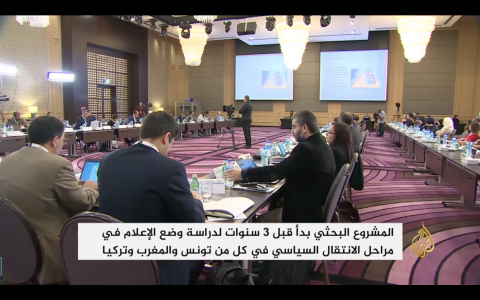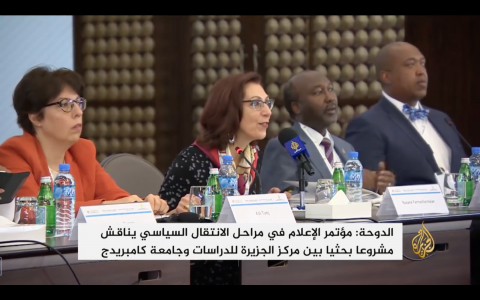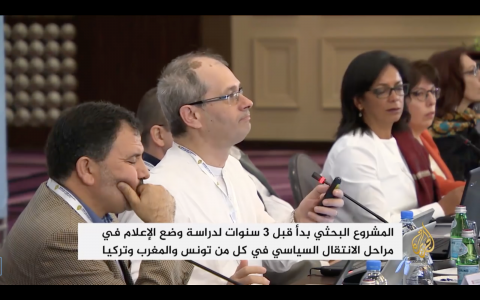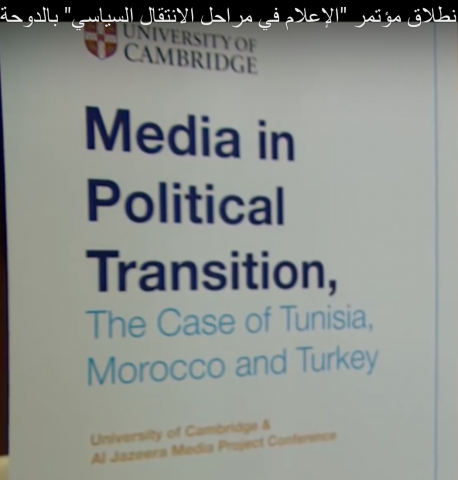
Media in Political Transition in
the Southern Mediterranean
Findings:
RELATIONSHIP BETWEEN GOVERNMENT AND MEDIA
Structure
Successive government leaders in post-Ben Ali Tunisia have realised the utility of a media subservient to the state and have been reluctant to support proper freedom of information and communication. In short, they have repeated the practices of previous leaderships, justifying authoritarian action as an entitlement of government. In reality, they have revealed their own anxieties about media freedom and fears over the dissemination of opposition opinions. The arbitrary practices of authoritarian rule have not been eradicated and the media are still seen as a weapon in a political struggle, rather than as a fully independent structure and essential vehicle of public participation in the construction of a new political order. George Joffé, Government–media relations in Tunisia: A paradigm shift in the culture of governance?
In Turkey, the broad ‘structural’ features of media markets have exhibited remarkable continuities over the past twenty-five years. At the same time, they have ‘interacted’ in historically contingent ways, to become a key ingredient in the ongoing drama of political events. At a more specific level the tools used by the present AKP government to pressure and control media outlets and individual journalists, have been used before. Ayşe Öncü, Government/Media Relations in Turkey: The Makings of an authoritarian order.
In Morocco, the wave of political liberalization and democratization in the second half of the 1990s resulted in major media reforms. The evidence on the media reforms following the adoption of a revised Constitution in 2012, however, indicates no real political will to democratize. As a competitive authoritarian regime, the state utilizes democratic institutions to reform its media system while entrenching these institutions via authoritarian laws. Bouziane Zaid, Structure: Media in Political Transition, Morocco.
Surveillance
As the importance of online media content grows in Tunisia, the Internet infrastructure is increasingly supplanting or overlapping with traditional telecommunication systems. Bruno Latour argues that in its application, science is often politics by other means. Our research shows, that in practice, the governance of the Internet in Tunisia has taken a liberal turn since 2011. Yet it also indicates that direct state ownership or operation is not necessary for state interception. The organisation of the market and the political culture in Tunisia have created an environment in which ISPs willingly cooperate and share data with the Interior Ministry. As yet, there are no structural guarantees to protect Tunisians from having their online freedoms curbed. Alexis Artaud de la Ferrière and Narseo Vallina-Rodriguez, The scissors and the magnifying glass: Internet governance in the transitional Tunisian context.

Trolling to protect the AK Party’s ideological line, an internet surveillance tactic generally thought to be organized and managed from within the AK Party and the Turkish government, appears instead, based on field research and algorithmic evidence, to be a more dispersed phenomenon, with independent AKP trolls often exercising initiative outside of any organised plan or process. Erkan Saka, Social Media in Turkey as a space for political battles.
In the aftermath of the Moroccan uprisings and adoption of the amended Constitution, both the state and members of citizen media engaged in a game to create and/or dominate the field of online citizen activism. Despite the unequal balance of power between the players, both sides managed to have significant reflexive impacts on the other, in the case of the state, driving its adoption of internet spyware, in the case of media collectives, such as Mamfakinch, sparking internal crises that eventually led to their demise. What is evident is that this relationship and interaction were not one-sided, demonstrating a process that likely will replicate itself in the future. Samia Errazzouki, Under Watchful Eyes: Internet Surveillance and Citizen Media in Morocco, the case of Mamfakinch.
THE WHO, WHY, WHAT & HOW OF THE MEDIA SECTOR
The Business of Media
In Tunisia, the mediascape has changed radically since the ousting of President Ben Ali, with substantial gains strikingly visible in the level of television news audiences, the range of reporting across all platforms, the drop in self-censorship, the rise in audio-visual and press outlets, and the passion (and ferocity) with which media laws and structures are being contested by both new and old elites. Roxane Farmanfarmaian, What is private, what is public, and who exercises media power in Tunisia? A hybrid-functional perspective on Tunisia's media sector.

In Turkey, the media serves as a surprisingly accurate mirror of the government’s stance at any time between democracy and authoritarianism. Today the media’s functionality is trapped at the intersection of complexities such as partisan politics, authoritarian tendencies, and capitalist market rules. Hybridity is evident in the amalgam of traditional media and independent news initiatives, the rise of advertising expenditures and the concomitant fall of journalism’s integrity. Aslı Tunç, All is Flux: A Macro Analysis of the Turkish Media Scene from A Hybrid Media System Perspective.
 The media market in Morocco has been undergoing significant transitions. On the one hand has been the declining role of the political parties in the press sector; on the other, an increase in the power of the financial sector, which strengthened in 2015. The financial help given by the State to the non-partisan paper and web press since 2015 has become an issue for publishing companies, which face financial difficulties and ever diminishing sales figures. This is even more serious for Arabic publications as their advertising income is less than that of the French publications, although the latter are not as widely read. Abdelfettah Benchenna, Driss Ksikes, Dominique Marchetti, The Media in Morocco: A highly political economy.
The media market in Morocco has been undergoing significant transitions. On the one hand has been the declining role of the political parties in the press sector; on the other, an increase in the power of the financial sector, which strengthened in 2015. The financial help given by the State to the non-partisan paper and web press since 2015 has become an issue for publishing companies, which face financial difficulties and ever diminishing sales figures. This is even more serious for Arabic publications as their advertising income is less than that of the French publications, although the latter are not as widely read. Abdelfettah Benchenna, Driss Ksikes, Dominique Marchetti, The Media in Morocco: A highly political economy.
The Unique Role of Radio
The AKP has built a supportive network entrenched in politics, the economy, and civil society, thereby sustaining its electoral dominance while giving media outlets the opportunity to expand, a process observable in Konya and other parts of the Anatolian heartland, as well as at the national level. Radio is embedded in this context. This integrated network is having a lasting impact on local radio sectors as a whole in structuring advertising streams, ownership, and content. What’s more, a counter-discourse of the Islamist periphery against a Kemalist conception of Turkey has developed momentum, and has entrenched itself in audiovisual media at the local level while expanding through these political and socio-economic networks into the centre. Ali Sonay, Local Media in Turkey: The Development of the Radio Landscape in Konya.
Since 2011 the intersection between media and civil society organisations, both of which have bloomed in Tunisia, has become a powerful source of support for the development of citizen-run (or associative), community-based radios. The partnership of these two sectors provides significant benefits in terms of funding provision, democracy promotion and capacity building, although, they can also place limits on the independence and future growth of these citizen radio platforms. The message, financing and regulation of this growing field of civil society/citizen radio output remains at the centre of a continuous negotiation of powers shifting to the public sphere. Samar Semir Mezghani, Reinforcing citizenship through civil society and media partnerships: The case of community radios.
The radio market in Morocco has developed significantly since the sector was liberalized and private stations allowed to come into being, providing the possibility for listeners of switching between a variety of stations with new topics and programme formats. The introduction of private radio stations is seen by the populace at large as a positive change, enabling ‘more variety for entertainment and information,’ and ‘using plain language’ to discuss ‘new topics that deal with people’s everyday lives, and social problems.’ Ali Sonay, Liberalizing Media in Authoritarian Context: Radio Listening in Contemporary Morocco.

THE AUDIENCE, THE NARRATIVE AND THE NATIONAL IMPACT OF JOURNALISM
Women in Television Talk Shows
Until 2011, there was only one public image of Tunisian woman, defined by characteristics perceived by its leaders to embody the modern Tunisian state. The uprisings of 2011 dissolved the repressive mechanism that had supported the artificial public space engineered by the state. Out of this process came the democratisation of the public view of women. However, television and talk shows in particular have not only served as platforms for the presentation of plural identities but have also emerged as a location for and producer of conflict, debate, and tension over the definition and renegotiation of Tunisian womanhood. This in turn interacts with and impacts the medium itself, as presentation of such a contested and critical subject challenges its capabilities. Zoe Petkanas, Negotiating identity: gender and Tunisian talk shows.
Women‘s television talk shows reflect a particular narrative used by the ruling party in the “New-Turkey” era. The New Turkey includes assumptions about being an ideal woman / man as well as appropriate patterns of how motherhood / fatherhood and gender relations are mobilised in order to categorise and shape public opinion. These political values, circulated to the public through media resources, help sustain a certain gendered discourse of both femininity and masculinity. Yeşim Burul and Hande Eslen-Ziya, Understanding “The New Turkey” Through the Eyes of Women: Gender Politics in Turkish Daytime Talk-Shows.
In Morocco, talk shows are prevalent and popular, and there are a number of shows hosted by women that specifically target female audiences, a few of which use highly original audio-visual techniques to capture the audience's attention. Not a single show addresses rural women, however, and instead, all are directed toward middle class, urban women; which, while giving them voice, tend to approach the issues pedagogically, and support traditional and conservative gendered roles. Kenza Oumlil, The Representation of Women in Moroccan Television Talk Shows.
New Cross-Border Narratives
Islamist Salafist groups are using social media as a counter-space to challenge the prevailing secular media narrative in Tunisia. Yet, while Salafist Islamists have increased their activism, the secular message remains dominant. This discursive marginalisation leaves many groups seen, but not heard, in the media. The Salafist Ansar al-Sharia in Tunisia movement serves as a case study to unpack the role cyber-activism plays in giving voice to the resistance and redefining the public. Despite being officially banned from public communication activities, the Salafist current uses the Internet to challenge the narrative and mobilise on the ground. Kayla Branson, Islamist cyber -activism: Contesting the message, redefining the public.
Islamist opinions in the Turkish press represent an array of perspectives based on historical, political and economic factors. These different outlooks became more marked as the Gülen crisis deepened, confounding the view that Islamist journalism is monochromatic, and offering unusual insight into the different positions being adopted toward key issues that culminated in the failed coup of 2016. Michelangelo Guida, Corporatism and fears: Islamist press after June 2013.
The Turkish media’s framing of the Kurdish issue and the ephemeral government-PKK peace process, has been a strategic tool in propagating each outlet’s own ideological stance and attacking their opponents. The representation of the low intensity war and the peace process is itself illustrative of the highly polarized domestic politics of Turkey. Ayse Seda Yuksel, Representation of Terror and Ethnic Conflict in the Turkish Press: An Analysis of the Peace Process in Turkey.
As media control, political manipulation, insecurity and extremism play an increasing role in the parameters surrounding the Southern Mediterranean’s public squares, young mediapreneurs are exploring how to function as a responsible force of resistance within states undergoing political transition. Social and web-based media activism in Morocco, Tunisia and Turkey have helped elaborate and expand the public sphere from a space previously inhabited either by ‘official’ organs of state or anti-government social movements, to a more nuanced one that provides a ‘public’ good – a space no longer devoid of its own politics, but which has become the site of political, professional, and civic tension. Roxane Farmanfarmaian, Mediapreneurship in Morocco (Tunisia and Turkey): Web Resistance 2.0.

